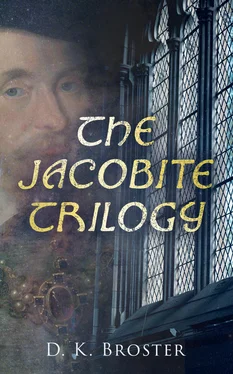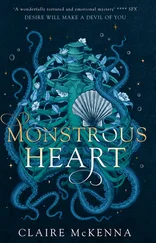“You devil!” exclaimed Keith, springing up. “What did you say to him about me?”
Guthrie kept his seat, and pulled down Captain Foster, who, murmuring “Gentlemen, gentlemen!” had risen too. “Nae need tae be sae distrubel’d, Captain Foster; I’m na. That’s for them that hae uneasy consciences. What did I say tae him? Why, I tellt him the truth, Major Windham: why ye set such store on saving his life, and how ye thocht he micht be persuaded tae ‘drap a hint’ aboot Lochiel. Forbye he didna believe that at first.”
Keith caught his breath. “You told him those lies . . . to his face . . . and he believed . . .” He could get no farther.
“Lies, were they?” asked Guthrie, leaning over the table. “Ye ne’er advised me tae bring him into camp tae ‘complete ma knowledge’? Eh, I hae ye there fine! Aweel, I did ma best, Major Windham; nane can dae mair. But I doot he has the laugh of us, the callant, for he tellt me naething, either by hints or ony ither gait, a’ the time I had him in ma care. So I e’en sent him wi’ a bit report tae Fort Augustus, and there he is the noo, as ye may have heard, if ye speired news o’ him when ye came by.”
Keith had turned very white. “I might have known that you would play some dirty trick or other!” he said, and flung straight out of the room.
Fool, unspeakable fool that he was not to have foreseen something of this kind with a man of Guthrie’s stamp! He had had moments of uneasiness at the thought of Ardroy’s probable interview with him, but he had never anticipated anything quite so base as this. “Take me to Lieutenant Paton at once!” he said peremptorily to the first soldier he came across.
The man led him towards a barn looming through the mist at a little distance. The door was ajar, and Keith went in, to see a dimly lit space with trusses of straw laid down in rows for the men, and at one end three horses, his own among them, with a soldier watering them. The young lieutenant, his hands behind his back, was watching the process. Keith went straight up to him.
“Can I have a word with you alone, Mr. Paton?”
The young man stiffened and flushed; then, with obvious reluctance, ordered the soldier out. And when the man with his clanging buckets had left the building, Paton stood rather nervously smoothing the flank of one of the horses—not at all anxious to talk.
“Mr. Paton,” said Keith without preamble, “what devil’s work went on in your camp over the prisoner from Ben Loy?” And then, at sight of the look on Paton’s face, he cried out, “Good God, man, do you think that I had a hand in it, and is that why you would not break bread with me?”
Lieutenant Paton looked at the ground. “I . . . indeed I found it hard to believe that you could act so, when you seemed so concerned for the prisoner, but——”
“In Heaven’s name, let us have this out!” cried Keith. “What did Major Guthrie say to Mr. Cameron? He appears to have tried to make him believe an infamous thing of me—that I went back to the shieling that night merely in order to get information out of him! Surely he did not succeed in making him think so—even if he succeeded with you? . . . Answer me, if you please!”
The younger man seemed very ill at ease. “I cannot say, sir, what Mr. Cameron believed about you in the end. He certainly refused, and indignantly, to believe it at first.”
“He cannot have believed it!” said Keith passionately. “ ‘In the end’? How long, then, did Major Guthrie have him in his custody?”
“He kept him for twenty-four hours, sir—in order to see if he would make any disclosures about Lochiel.” And Lieutenant Paton added, in a very dry tone, turning away and busying himself with a horse’s headstall, “A course which it seems that you yourself advised.”
Keith gave a sound like a groan. “Did the Major tell Mr. Cameron that also?”
Paton nodded. “Yes, he did—and more, too: whether true or not I have no means of judging.”
Keith had the sensation that the barn, or something less material, was closing in round him. This honest boy, too—— “Look here, Mr. Paton, I will be frank with you. I was so desperately afraid that Ardroy would be left to die there in the shieling that I did suggest to Major Guthrie that it might be of advantage to bring him into camp, though I knew that he would have his trouble for nothing. Though I unfortunately recommended that course I was perfectly certain that Mr. Cameron would not give the slightest inkling of any knowledge that he might have.”
“No, it was plain from the beginning that he would not,” said the young man, “and that was why . . .” He broke off. “If Mr. Cameron is a friend of yours it is a good thing that you were not in our camp that morning . . . or no, perhaps a misfortune, because you might have succeeded in stopping it sooner. I could not.”
“Succeeded in stopping what?” asked Keith. Then the inner flavour of some of Guthrie’s recent words began to be apparent to him. He caught Paton by the arm. “You surely do not mean that Major Guthrie resorted to—violent measures? It’s impossible!”
Thus captured, the young soldier turned and faced him. “Reassure yourself, sir,” he said quickly, seeing the horror and disgust on his companion’s face. “He could not carry them out; the prisoner was in no state for it. He could only threaten, and . . . question.”
“He threatened to shoot him after all?”
“No, not to shoot him, to flog him.” And as Keith gave an exclamation and loosed his hold, Paton added, “And he went very near doing it, too.”
“Threatened to flog him! Mr. Paton, you are jesting!” said Keith incredulously. “Flog a badly wounded prisoner, and a gentleman—a chieftain—to boot!”
“I am not jesting, sir; I wish I were. But I am thankful to say that it was not carried out.—Now, if you will excuse me, Major Windham, I must be about my duties.” His tone indicated that he would be glad to leave a distasteful subject.
But Keith made a movement to bar his passage. “Mr. Paton, forgive my insistence, but your duties must wait a little. You cannot leave the matter there! For my own sake I must know what was said to Mr. Cameron. You see how nearly it concerns my honour. I implore you to try to recall everything that passed!”
Reluctantly the young man yielded. “Very well, sir; but I had best speak to the sergeant to ensure that we are not disturbed, for this barn is the men’s quarters.”
He went out to give an order. Hardly knowing what he did, Keith turned to his horse, busy pulling hay from the rack, and looked him over to see that Mackay had rubbed him down properly. Threatened with flogging—Ewen Cameron!
Paton came back, closed the door and brought up a couple of pails, which he inverted and suggested as seats. “You must be tired, Major, after your long ride, and I am afraid that this will be a bit of a sederunt.” So Keith sat down in the stall to hear what his ill-omened suggestion had brought on the man whom he had saved.
Table of Contents
It appeared that Major Guthrie, on learning next morning of Major Windham’s departure on his errand of mercy, had been not only exceedingly angry, but suspicious as well—“or at least,” said Paton, “he declared that he was suspicious”—and sent off a party almost immediately to fetch in the wounded rebel from the shieling. About a couple of hours later they returned, carrying him on a litter, which they deposited outside their commander’s tent, where Paton happened to be at the moment. Guthrie immediately went out to him, and said—the narrator remembered his first words exactly—‘Well, my fine fellow, and so you know where Lochiel is like to be skulking!’ The prisoner replied by asking whether Major Guthrie thought he should tell him if he did? Major Guthrie retorted, with a grin, that he knew it was the thing to begin with a little bluster of the sort, but that they had better get to business without wasting time. “And he added, sir,” said the young soldier, looking away, “ ‘I know that you know; Major Windham says so.’ ”
Читать дальше












